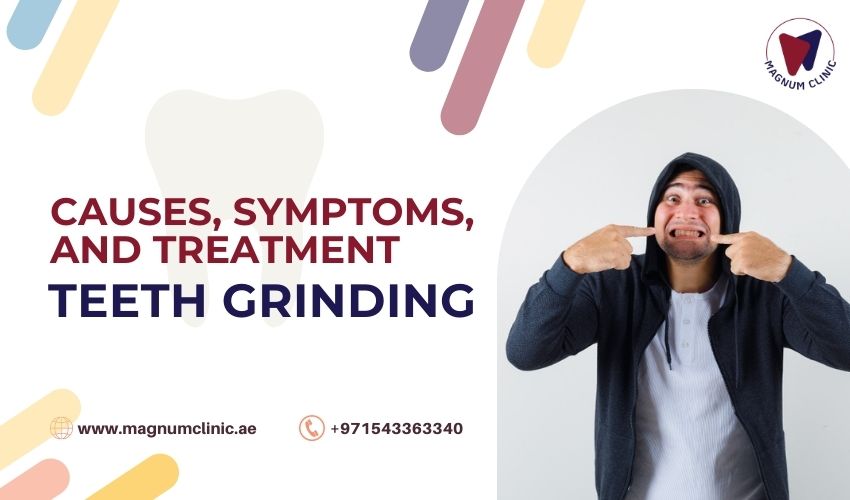Teeth Grinding (Bruxism): Causes, Symptoms, and Treatment Options

Teeth grinding, also known as bruxism, is a common problem that affects people of all ages. It is a condition where you unconsciously grind, clench or gnash your teeth together. Teeth grinding can happen during the day or at night while you are asleep. It can cause a lot of damage to your teeth and jaw if left untreated. This article will focus on the causes, symptoms, treatments, and other details of teeth grinding.
Introduction
Teeth grinding is a common problem that affects millions of people worldwide. It can cause a lot of damage to your teeth and jaw, leading to serious dental problems. It is essential to understand the causes, symptoms, and treatments of teeth grinding to prevent any long-term damage to your teeth and jaw.
What is Teeth Grinding (Bruxism)?
Teeth grinding or bruxism is a condition where you unconsciously grind, clench or gnash your teeth together. It can happen during the day or at night while you are asleep. It is a common problem that affects people of all ages. Most people with bruxism are not aware of the condition until they start to experience symptoms.
Causes of Teeth Grinding
There are many causes of teeth grinding, and they may vary from person to person. Some common causes of teeth grinding are:
- Stress and anxiety
- Abnormal bite or crooked teeth
- Sleep disorders
- Medications
- Alcohol and drug use
- Parkinson's disease
- Acid reflux
- Smoking
- Caffeine intake
Symptoms of Teeth Grinding
Teeth grinding can cause many symptoms that may vary from person to person. Some common symptoms of teeth grinding are:
- Headaches
- Jaw pain and stiffness
- Tooth sensitivity
- Earache
- Facial pain
- Clicking or popping of the jaw joint
- Chipped or fractured teeth
- Difficulty sleeping
- Wear on teeth
Diagnosing Teeth Grinding
If you suspect that you have bruxism, it is essential to consult a dentist or a doctor for diagnosis. Your doctor may examine your teeth and jaw for signs of teeth grinding. They may also ask you questions about your symptoms and medical history. They may recommend further tests, such as a sleep study or an X-ray of your jaw.
Treating Teeth Grinding
There are several treatments for teeth grinding, and they may vary from person to person. Some common treatments for teeth grinding are:
Mouthguards
Mouthguards are custom-made dental appliances that are designed to fit over your teeth and protect them from grinding and clenching. They are usually worn at night while you sleep. They can help reduce the symptoms of teeth grinding and prevent long-term damage to your teeth and jaw.
Stress Management
Stress and anxiety are significant causes of teeth grinding. Therefore, stress management techniques such as meditation, yoga, or deep breathing exercises can help reduce the symptoms of teeth grinding.
Medications
In some cases, your doctor may prescribe muscle relaxants or antidepressants to help reduce the symptoms of teeth grinding.
Dental Correction
If teeth grinding is caused by an abnormal bite or crooked teeth, your dentist may recommend dental correction, such as braces or Invisalign.
Surgery
In severe cases, surgery may be required to correct the underlying problem that is causing the grinding of the teeth.
If you're experiencing symptoms of teeth grinding, visit Magnum Dental Clinic in Dubai for a consultation with our experienced dental professionals. Let us help you find the right treatment to protect your teeth and improve your overall oral health.
FAQs Related Teeth Grinding (Bruxism)
1. What causes teeth grinding at night?
Teeth grinding at night can be caused by several factors, including stress, anxiety, sleep apnea, and an abnormal bite or crooked teeth.
2. Can teeth grinding cause tooth loss?
Yes, bruxism can cause tooth loss, especially in severe cases where the grinding is left untreated for a long time. Over time, the constant grinding and clenching of teeth can wear down the enamel and cause teeth to become loose or even fall out.
3. Can a mouthguard help with teeth grinding?
Yes, wearing a mouthguard or splint can help protect teeth from further damage caused by grinding or clenching. These devices are custom-made by a dentist to fit the patient's teeth and provide a barrier between the upper and lower teeth.
4. What are the symptoms of teeth grinding?
The symptoms of teeth grinding may include: jaw pain, headache, earache, worn or cracked teeth, sensitivity to hot and cold, and disturbed sleep.
5. How is teeth grinding diagnosed?
Your dentist can diagnose bruxism by examining your teeth for signs of wear and tear, as well as by asking you about your symptoms and medical history.
6. What are the treatment options for teeth grinding?
Treatment options for teeth grinding may include mouthguards or splints, stress reduction techniques, and addressing underlying medical conditions. In severe cases, medication or surgery may be necessary.
7. Can teeth grinding cause long-term damage?
Yes, chronic teeth grinding can lead to long-term damage such as tooth decay, tooth loss, and temporomandibular joint (TMJ) disorder.
8. How can I prevent teeth grinding?
To prevent teeth grinding, you can try stress reduction techniques such as meditation, yoga, or exercise. Additionally, avoiding caffeine and alcohol before bedtime and practicing good sleep hygiene may also help.
9. Should I consult a dentist if I suspect I am grinding my teeth?
Yes, it is important to consult a dentist if you suspect that you are grinding your teeth, as untreated bruxism can lead to serious dental and medical issues. Your dentist can evaluate your symptoms and recommend the appropriate treatment.
